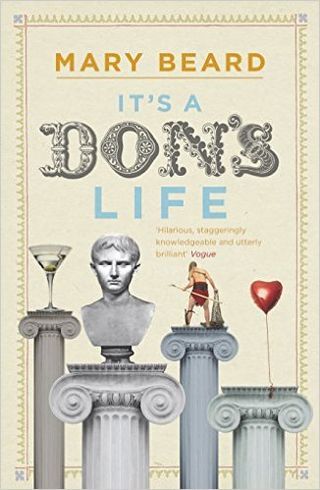Mary Beard's Blog, page 16
February 24, 2016
Be careful with the Classics
Whenever Boris Johnson gets in the news, it's a prompt for the classical parallels to come flooding out -- and a warning about how misleading they can be. Boris's rather histrionic decision to back the Out campaign and so desert David Cameron (with whatever aims at replacing him . . .) has elicited quite a few 'Et tu, Brute's, Shakespeare's last words of Julius Caesar, as he fell murdered by his one time friend and colleague Marcus Junius Brutus on the Ides of March 44 BC -- the ultimate case of disloyalty.
Classicists are forever pointing out that "Et tu Brute" were not actually what the ancients said that Caesar said as he died. The best bet is that he said to Brutus (in Greek) 'kai su teknon?' or 'and you my child?', fuelling the suspicion that Brutus was actually Caesar's illegitimate son ('teknon' could be literally 'son' or a more general term of affection for a younger man). But what is less often pointed out is that the assassination was a rather inglorious failure, and not a successful coup at all. It wasn't just, as Shakespeare had it, that Brutus and his colleagues were shortly defeated by the supporters of the murdered leader (so watch your back, Boris). It was also that there whole political programme proved futile. They set out to destroy not just the tyrant, but also tyranny, in the name of Libery. The actual result of the assassination, after more than a decade of civil war, was autocracy (aka tyranny) established on a permanent basis under the emperor Augustus.
So 'et tu Brute' isnt quite as apt as it is often assumed to be.
Something similar is true with the Cincinnatus parallel that Boris himself drew a few years ago, and has been repeated this last week: "If, like the Roman leader Cincinnatus, I were to be called from my plough to serve in that office , I wouldn't, of course, say no."
Cincinnatus was a 'hero' of early Rome, and best known for being called from his farm (and his plough) to take charge of the city when they were in dire straits fighting against their neighbours, the Aequi. And he was so honourable that once he had won the war, rather than continuing in power, he just returned to the plough. (That's his statue at his name city of Cincinnati, above).
That's the nice bit. What's less often remembered is that Cincinnatus was one of the most virulent haters of the lower orders (the "plebeians" of A Mitchell fame), one of the most enthusiastic defenders of the privileges of the patricians -- and the keenest to keep the plebs out.
Now I dont think that was quite what Boris meant, but just possibly there is more truth in the comparison than he intended.
(Photo above by Jeff Moore)
February 21, 2016
What poems make women cry?
A couple of years ago there was a great anthology, which caught people's imagination and in the process made a nice sum for Amnesty (which was the beneficiary), called Poems that make Grown Men Cry. It was a neat and provocative surprise: grown men aren't "supposed" to cry at poetry, so having a hundred of them fessing up to it, and talking about their own tear-jerking poem, was immediately enticing. It was Owen's Dulce et Decorum for Christopher Hitchens, Keith Douglas's Canoe for Clive James, Sassoon's Everyone Sang for Barry Humphries; and there was a good sprinkling of AUden and Larkin.
When Anthony Holden asked me to suggest a poem for the female companion volume, I didn't hesitate to say yes -- it was a good cause after all. But I didnt think that it would have quite the ��clat of the men's book. I mean women are "supposed" to cry at poetry, so where's the surprise.
I've now seen an advance copy of the book, and I'm happy to report that I was wrong. It is a wonderfully moving and unexpected volume, both in the choices, and the match of choice to woman.
I'm not going to give it all away, as the book is not out till February 25th (but available to pre-order now!). I will say, however, that there is considerably less Auden and Larkin. And I will tell you what I chose.
It is by Ezra Pound, or more strictly by Sappho and Ezra Pound; and it's very short. Entitled "Papyrus", it runs simply:
"Spring . . .
Too long . . .
Gongula . . ."
It's Pound's fragmentary version of a papyrus fragment of Sappho. In one way, this has always puzzled me. Was Pound taking the piss? So much of Sappho is now like this, so what does it say about us that we claim to admire admire it? Or was it a clever gesture to the fragility and fragmentariness of our connection with the ancient world?
But, at the same time, puzzle or not, it's never left my head since I first read it 40 years ago. Just those four words are enough to evoke love, loss and absence. It's poetry pared down to the barest essentials.
It is I can assure the shortest poem in the book. There's 99 others well worth shelling out a few quid for.
February 19, 2016
Vitellii in Genoa
I was idly googling a couple of weeks ago, in that late night kind of way -- when, searching for the emperor Vitellius, I came across a notice about a "single object" show in Genoa, featuring a splendid things my emperors seventeenth version of a portrait of that short-lived, rather disreputable Roman ruler (of course, that reputation is very largely to do with the fact that he was a losing claimant in the civil war of 69 CE, and it was in the interests of the winners,  Vespasian and co, to blacken him). The statue looked tremendous, and obviously based on the so called "Grimani Vitellius" in Venice (on the right) -- an ancient portrait statue, once believed to represent Vitellius, though it's almost certainly not him. (That's one of the things that my emperors' project is interested in... how particular "faces" get strongly associated with particular rulers, even though they actually have nothing to do with them at all.)
Vespasian and co, to blacken him). The statue looked tremendous, and obviously based on the so called "Grimani Vitellius" in Venice (on the right) -- an ancient portrait statue, once believed to represent Vitellius, though it's almost certainly not him. (That's one of the things that my emperors' project is interested in... how particular "faces" get strongly associated with particular rulers, even though they actually have nothing to do with them at all.)
Anyway, the show -- in the Royal Palace Museum (Palazzo Reale) -- was only on till the end of February, so I thought I had to get over to see it. I really hit lucky. For a start, it proved to be a tremendous piece, probably by the sculptor Filippo Parodi, and well worth the schlepp. Secondly I happened to bump into one of the curators, who knew a lot about the piece and we had a great chat (she had been at the main entrance and rightly inferred that someone who comes into a museum and specially asks for "il ritratto di Vitellio" is there on a mission. And thirdly, there were some more Vitellii to be found,
One I came across by accident in the amazing Gallery of the Mirrors in the Palace. This proved to be an over the top but also rather jokey kind of place. One rather obvious joke must be this panel (below right) of a little Cupid labelled "Crapula" (which means "hangover"). But what about the Vitellius at the top being strangely  embraced by some kind of Cupid (?), not how his is usually depicted at all. I still haven't the foggiest clue what is going on here, but the helpful curator with whom I discussed it, said that the portrait of Vitellius here was related from another Vitellius in town, the so-called "Vitellio Durazzo". This was once thought to be a Roman original (and was much admired by early tourists) but is now generally thought to be another seventeenth century version of the "Grimani Vitellius" in Venice. (That's a further linking theme in what I am doing: more often than you would imagine it is hard to tell ancient from modern images of emperors.) The Durazzo, she explained, was now in the Museo of the Accademia Ligustica di Belle Arti, not far away. So I went over to have a look.
embraced by some kind of Cupid (?), not how his is usually depicted at all. I still haven't the foggiest clue what is going on here, but the helpful curator with whom I discussed it, said that the portrait of Vitellius here was related from another Vitellius in town, the so-called "Vitellio Durazzo". This was once thought to be a Roman original (and was much admired by early tourists) but is now generally thought to be another seventeenth century version of the "Grimani Vitellius" in Venice. (That's a further linking theme in what I am doing: more often than you would imagine it is hard to tell ancient from modern images of emperors.) The Durazzo, she explained, was now in the Museo of the Accademia Ligustica di Belle Arti, not far away. So I went over to have a look.
 At first I couldnt find the damn thing. There were lots of great paintings, and a nice group of plaster casts, but no sign of an emperor (and it didnt ring a bell either with the nice and chatty lady who was the custodian). Eventually I found it (left), on the floor in what was -- as you can see -- close to a mock up diorama of early artistic practice (below).
At first I couldnt find the damn thing. There were lots of great paintings, and a nice group of plaster casts, but no sign of an emperor (and it didnt ring a bell either with the nice and chatty lady who was the custodian). Eventually I found it (left), on the floor in what was -- as you can see -- close to a mock up diorama of early artistic practice (below).
I havent begun to process all this, but one thing's for sure: this very briefly ruling emperor is going to have a bigger part in my book.
February 14, 2016
Old-fashioned human kindness (beats Twitter)
Those of you on Twitter will already know, I suspect, about my lost diary. I am a judge of an international prize, whose committe was meeting in Berlin last week. It was all a bit of a rush, and when I was waiting for the flight in the frequent flyer lounge at Heathrow, I used the time to do my email and make some dates in the diary (pictured above). When I got to Berlin, all was fine except I didn't any longer have my diary, which I concluded that I had left where I had been sitting Minor disaster. It wasnt that there were all that many appointments that I would have forgotten (my indispensible assistant keeps a copy of most things, for just this eventuality) but there were a few and there were all kinds of carefully coded password reminders, which would have been a real nuisance not to have.
Anyway, lost property at airports is a bit hit and miss. And, even though I knew exactly where this little book was, the Heathrow lost property online reporting system basically told you to sit tight and wait for three days. Reasonable enough maybe, but I really wasnt sure that I could wait that long with equanimity (and it wasn't as if the damn thing was flying round the world...it wasnt nickable and I could describe exactly where it must be).
So I resorted to Twitter.
Twitter is the new consumer complaint/request medium of choice. You can, for example, send some written or online complaint to the railway company about the state of the loos or the absence of heating on the train, and wait for weeks before you get the form reply ("we are sorry you were not satisfied with your journey with us..."). If you tweet you can often hear back instantly, occasionally with some promise of action. Big companies obviously employ battalions of people manning their Twitter accounts day and night (and to be honest, the more followers you have -- and so the more people liable to see your complaint -- the quicker the response is likely to be).
In this case, there some encouraging signs came by taking this route. For a start, I got loads of sympathy, which made me feel hugely better (perhaps more sympathey than I deserved: it had after all been entirely my own fault and the loss wasnt exactly life threatening, even though it felt a bit like that!). And British Airways did get interested, both by Twitter and email. They told me when the lost property deliveries came to the central depot and they even found a diary which looked as it answered my description -- but in the end wasn't mine. I certainly couldnt complain that my pleas had gone unheard.
There were however a few downsides. Sharing one's cry for help with the world means exactly that, and soon there was a few lines on my plight in the obviously short-of-real-gossip Daily Mail (absent minded prof loses diary... which they imagined was my private intimate journal, not my meetings and computer passwords). And it didnt actually find the damn thing.
So in Berlin I went off to the first meeting resigned to waiting a long time before I knew the diary's fate (by this time I'd prepared for the worst by ordering a new one online). It was in one of the breaks that I checked my email on the iphone, to find a message from the lounge supervisor who had picked up my diary, took a look inside, noted the email address and got in touch. She hadnt seen my little Twitter panic, she was just being kind and sensible -- and she made my day.
And it got even better. She liaised with lost property, arranged to keep the diary in the lounge -- and as she was on duty when I got back from Berlin, she nipped down with the said item to give it to me in arrivals. To be honest, I didnt deserve it, but her sheer goodwill continues to brighten the weekend.
There is of course a moral: make sure your email is written in the front of your diary (others would say, make sure you have everything backed up on your phone).
February 10, 2016
Women and history writing (and history selling)
I put my pennyworth last week into a discussion in the Guardian about women and history writing, which was itself a follow up to an article a few weeks ago on a similar theme. The prompt was some recent statistics from the US and the UK on authorship of, and sales figures for, popular history writing, which showed not only how far the output was gender divided, but generally how many fewer books women historians sold than men. You can find some of the stats if you click on the earlier article. But an extra gloomy one was produced by the Bookseller, which tabulated the 50 top earning 'history and military' UK books since Nielsen Bookscan records began (about 20 years ago). 49 out of the top 50 were by men. The top 10 go like this:
Schama, History of Britain vol 1; Beevor, Stalingrad; Ackroyd, London; MacGregor, 100 objects; Beevor, Berlin the downfall 1945; Ambrose, Band of Brothers, E company, 506th regiment; Beevor, D Day; Schama, History of Britain, 2, British Wars; Hastings, All Hell let loose, The world at War 1939-45.
Excellent books, but you see what I mean.
Now quite a number of commentators on the article, above and below the line, wanted to insist that there really were great women historians, popular and academic. But that seemed to me to miss the point rather. Of course it's true, there are some wonderful and eloquent female historians; but however wondeful and eloquent they are, their books are simply not selling as much. And it's worth asking why that might be.
One answer worth considering is that women are writing history on less best-selling subjects. That is certainly one conclusion that you could draw from the US figures. Based on a sample from last year, in the sub-category of biography the majority of life stories were by men about men (with only 6% of the biographies of women being written by men). And the Bookseller chart, as its top ten titles suggest, is heavily weighted to political and military history, where fewer women make a name. Again, there are some excellent women writers dealing with military themes -- Margaret MacMillan and Joanna Bourke both come to mind -- but they are not selling in the massive quantities that rival the Beevors and the Hastings (the "big books by blokres about battles" as I rather unfairly called them).
I am not convinced that subject matter is the only answer here, even though it must play a part. As I said in my contribution to the debate, when you get to this level of sales, you have to be selling to spec, rather than planned, purchasers -- people who go into a bookshop (real or online) wanting a present, but as yet unsure what, or simply having something catch their eye. This is where, my hunch is, that quite a lot of the gendering comes in: partly because, as with speech, there remains a sense that "authority" still lies with the male writer than the female, and partly because of a sense of the risk-free in present buying (how many people would buy their uncle a brilliant book on housemaids in the late nineteenth century... you might well think that uncle ought to read it and that it is a brilliant book, but I suspect most people play safe with "London" or "A History of Britain" vel sim).
And publicity must have something to do with it too. A few people in the Guardian comments talked about the publisher and editor's support for the female writer. And of course that must be important. But I found myself wondering about the marketing and publicity department. I have been incredibly fortunate both with Profile and Liveright . Because, with very very few exceptions, even excellent books don't sell themselves (we shouldn't be so naive as to imagine that those books on the table at the front of the bookshop-chain are always there because the local branch staff happen to like them!). Maybe we need the stats on publicity spending to see what the correlation is.
Predictably enough, someone below the line foresaw gloomily that we would be wanting 'quotas' for women historians soon. Not a bit of it. But I do think a touch of consciousness raising might be in order. And maybe we could all get into the spirit of that by being rather less stereotyped, rather less risk averse when we next buy a book as a present for a bloke.
February 4, 2016
My Uncle Tom's funeral
It is, as I have remarked before, the blight of the eldery to see the other elderly in the grave. Today I went to my Uncle Tom's funeral in the beautiful St Mary's, Banbury (above), my Mum's younger brother. He had lived to be, on my reckoning, 88, and with a spirit that could still tell me a thing or two about SPQR (which I had sent him) just before Christmas.
It was a wonderful joyous, as well as sad, occasion. Tom had grown up as a reckless country lad in the Herefordshire village of Stretton Grandison, with two older sisters (my mother the first born), a Dad who was the village wheelwright etc, and a Mum who was the village school mistress (until she was married). His daughter Mandy (herself a teacher) gave a brilliant eulogy, capturing those days when kids like Tom bunked off school and did little more wicked than explore the local wells. And she reminisced about the visits with her Dad and Mum, and younger sister Nikki, to the local folk music evenings, so thick wth cigarette smoke that you'd be prosecuted if you took your children there now.
Tom had become an estate-agent cum auctioneer, and my own most vivid memories from way back were nothing to do with folk music, bit listening to him do his auctioneer patter. I had never known anyone to speak so quickly before (and I practised fruitlessly at home -- to be honest I'd have been useless at selling a sheep).
It was a good send off, from a reading of A E Housman to a great performance from the "Mad Hatters" band with their wry take on the nature of warfare (of which Tom had seen his fair share). And we repaired after to the local hostelry for a jolly good bash.
But I found myself also thinking about the guys who actually made these occasions possible. I was sitting near the front in the family pews, and I watched closely as the pallbearers, young and old, lifted the coffin onto their shoulders, linked arms and carried it off, with exraordinary dignity (though they must do it every da)y. It's hard to think that there is a more traditional or honourable task than that, carrying the dead to the grave.
Still not something that IT can replace.
February 3, 2016
Ten years of a wickedly subversive Don's Life
It is, I am happy to say, "our" tenth anniversary. That is perhaps a bit premature because, as I recall, my very first post was about student exams (and all the strange anxieties that surround them .. 'is it OK to write in purple ink?' and so forth), which must be pushing it a bit nearer towards the summer -- April as I now check. But all the same we have decided to mark its ten years with a 'TLS voices' podcast. This offers some reflections about the genre in the widest sense.
And it gives you a few stats about the whole enterprise. There have, for example, been nigh on 8 million page views since the blog began, and 38,000 comments. As I was preening a little about this, the editor wisely said that we didn't actually have all that many comparanda by which to judge. But comparanda or not, I am still pleased.
Do listen to the podcast.
I hope we can celebrate our ten years history with a bit of pride, as one of the most civilised, but frank, corners of the web, with an engagingly supportive community (sad to have lost some : Paul Potts died some months ago, and I fear Tony Francis too). And I hope we go on in the same way.
As I say on the podcast, I wouldnt mind getting rid of the moniker "wickedly subversive" (which I never invented in the first place - eh, ed?). But after 10 years I guess it's better to live with it, rather than to send a message to the world that at age 61 you had decided to stop being "wickedly subversive" What good would that do?
So here's to another 10 years of subversion. And keep the discussion flowing, as cleverly polite as always.
January 30, 2016
How to say "I disagree" in the 21st century
I dont think many commentators on this blog have much trouble in finding words in which to disagree, head on, full on, eyebrow to eyebrow (and usually with courtesy .. lets not forget!). But I am struck how often straightforward disagreement (a generally healthy state of affairs, which is often the bed-mate of broad agreement) has been recently hi-jacked by a whole load of denials. I would like to put in a plea for good, old-fashioned diasagreemeht.
If you follow Twitter (or any of the follow up comments after Question Time or any such programme), you'll be familar with this one: "Mary Beard is out of her depth here", or only slightly more impolitely, "Stick to what you know, Mary". What this actually means is that "I think you are wrong", but as your day job is to teach Classics, I will say that there is this no point in hearing you on this topic.
It doesn't take much to see that there is a disequilibrium here. If Mary, as citizen, says something you dont like, then it's easier to say that she is 'out of her depth' than to confront her arguments (which may of course be wrong.. that's another matter) about migration, Corbyn, the EU or whatever. It's easier to say, "you dont know what you are talking about", than answer the citizenly question.
A slightly different version is the patronising line of "I am disappointed in you". I have come across this recently over the Rhodes statue. I happen to believe that the university system and its curriculum is far too white, but the statue of Rhodes should not come down (as I said before). I can see the other side of the argument on the statue, but I do not agree. I actually think it's a more radical stance to leave the damn thing up.
That's why I feel particularly infuriated by the 'disappointment' line -- as if only the poor old dear got the point , she would see the error of her ways. The furthest reaches of this have been a bit mad. One tweet actually said, after the tweeter had pushed me to say that I actually knew someone who wasn't white (oh come on!), "On behalf of all white people, I'd just like to apologise again for Mary Beard." Another correspondent, a friend of mine, actually went so far as to suggest a course of retraining (or he would say discussion, but it sounded like retraining to me!).
At this point, I'd like to observe just one thing. That it is possible to disagree over all kinds of things (tactics, short term aims etc) without being enemies. That's life.
And, to push this a little further, maybe we dont want a world in which we all agree on absolutely everything,
January 26, 2016
Classics in Copenhagen: a plea for support
I know that I have recently been in a head to head with Boris Johnson about Greece versus Rome. B ut the truth is, of course, that as a subject of study they are symbiotic: Greece wouldnt we with us without Rome, Rome wouldn't have a sense of its "own" culture without Greece. That's why the announcement that the University of Copenhagen MAY be about to close its ancient Greek department seems to spell the end for Classics in Denmark (a country not currently distinguishing itself for liberal values in other ways).
There is a long and lustrous past to the study of Greek in Denmark. I think only of the work of Mogens Hansen on the ancient city (I disagreed with all kinds of premises, but still hugely important and unmatched in many ways). There is also the Ny Carlsberg Museum in the same city, with one of the best classical collections in the world. And the truth is that a great classical collection and a thrivig classical department in the local museum add up to more than the sum of its parts. In many ways, forget Edinburgh (sorry), Copenhagen is the Athens of the North.
I dont know exactly where we write to if we want to object, but I think an email to saxoinst@hum.ku.dk would eventually hit the spot. The idea that Denmark would have no place for the university-level study of ancient Greek is bad enough. But we also know that where Greek goes today Latin goes tomorrow, or the next day. Amd that would mean no classical culture, in the original languages at all in Denmark.
I hope we can save Denmark from itself. I know that it seems unpleasantly culture-colonial. But where Denmark goes tomorrow, we go the day after.
And if you want to know why I think that the abolition of Classics in wider terms is a bad idea, try this.
January 24, 2016
Reaching out to an expert
I get loads of queries and questions about things ancient usually by e-mail, from requests for suggestions on what to visit in Rome, to follow-ups on what I have written in a book. I try to answer all of them (if I havent answered yours that is pure inadvertence/absence of mind, so send it again). In fact all kinds of friendships have been struck up that way, but even if that wasn't the case, I find it hard to see how one could justifying encouraging people to buy one's book, but not answer a question that the book raises... or for that matter encouraging people to watch your tv programmes, but not tell them how they could visit some of the places you went to on screen. (I dont mean by that, that I think I am a quick answer to wiki. If you want to know the date of the battle of Cannae, google it -- dont ask me!)
And I am almost always very happy to answer questions from school students. Partly I am genuinely interested. Partly we are still just about in the same state joined-up education system, and responding to questions from kids at school feels like part of my job.
Almost always? Well, just occasionally, but it's on the increase, you get an email that runs like this.
"Dear Miss Beard, I am doing a project on ....... and as part of that my teacher has said that I should reach out to an expert. So could you please tell me why you think the Roman empire fell/why you think the Greeks discriminated against women/wheher you think Alexander the Great was a good thing. Thanking you in advance..."
I did use to reply briefly to those as best I could. But I often felt a bit of a mug.
More often than not I would discover that all my colleagues had had the same email too. Why reach out to one expert when for very little extra effort you could reach out to 40, or -- including all the uni classicists in the country -- 400? Suppose that half of those replied, at an average turn around time of 10 minutes, that adds up to about 33 person hours to answer what was a rather dopey question in the first place.
And sometimes if and when you had answered there would be no thanks. Reaching out to an expert obviously didn't include thanking her. Now and again, if I hadnt heard in a week or so, I would write and say "Just checking you got my reply".. in about 50% of cases, no more, I would get a rather sheepish, "o yes".
I have recently changed my tune. And to that kind of email, assuming it is from a sixth-former, I now reply saying that I am very happy to help, but that first they must tell me what they have READ on the subject, proper research being rooted in reading etc etc. About 30% never get back. The ones that do, get a much better reply.
I dont blame the students entirely. Somewhere out there (and it may be the A level specification) there is something or someone telling them that 'reaching out to an expert" is an important research skill.I'm not sure it is. But, anyway, please remember lads and lasses, if you want the best out of THIS expert: don't do a vast mail shot (we only find out and it annoys); do some reading and ask some questions on that basis, show you have put some work in; and do remember to say 'thank you' ( a complicated reply can take a lot more than 10 minutes to put together and it feels like a slap in the face to hear nothing).
The majority, of course, are doing all that already... but not all.
I wonder if anyone else has developed some workable strategies on this?
Mary Beard's Blog
- Mary Beard's profile
- 4110 followers


















